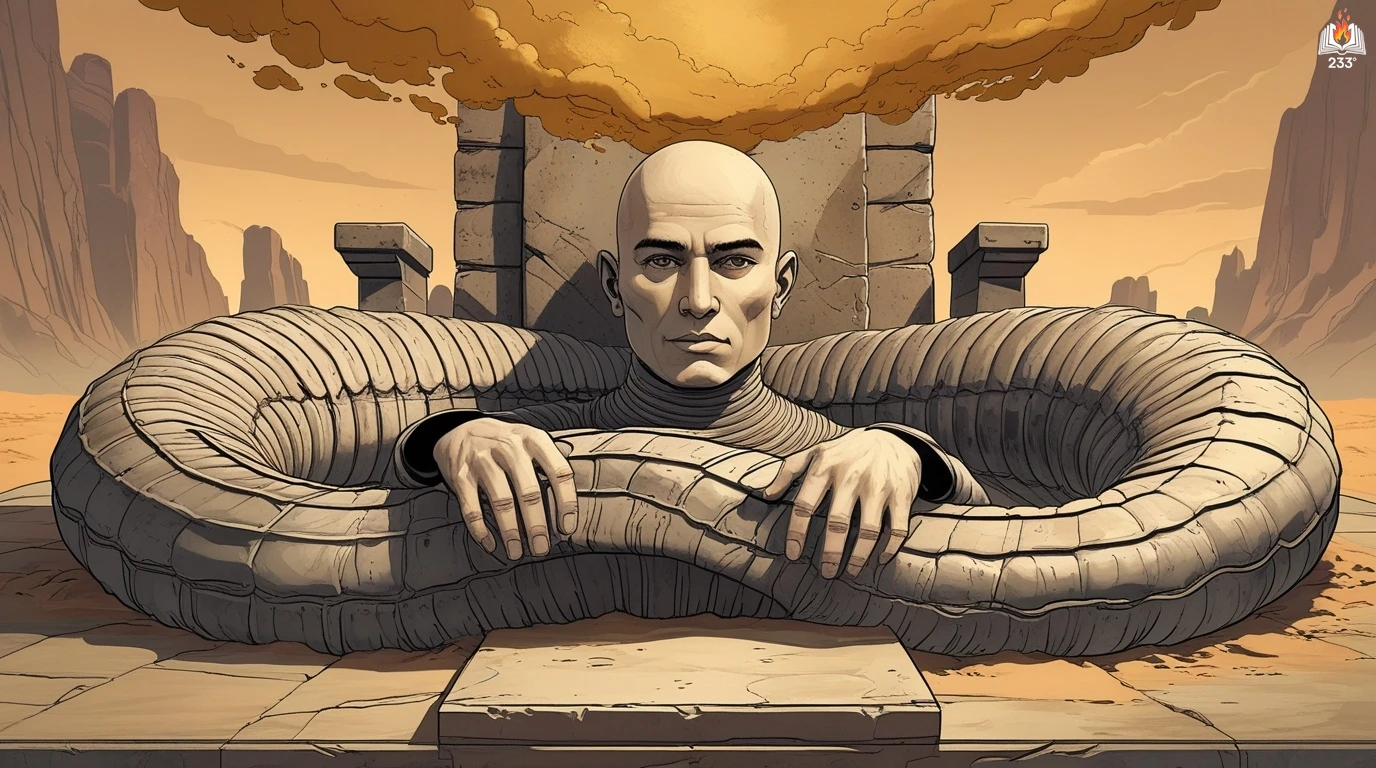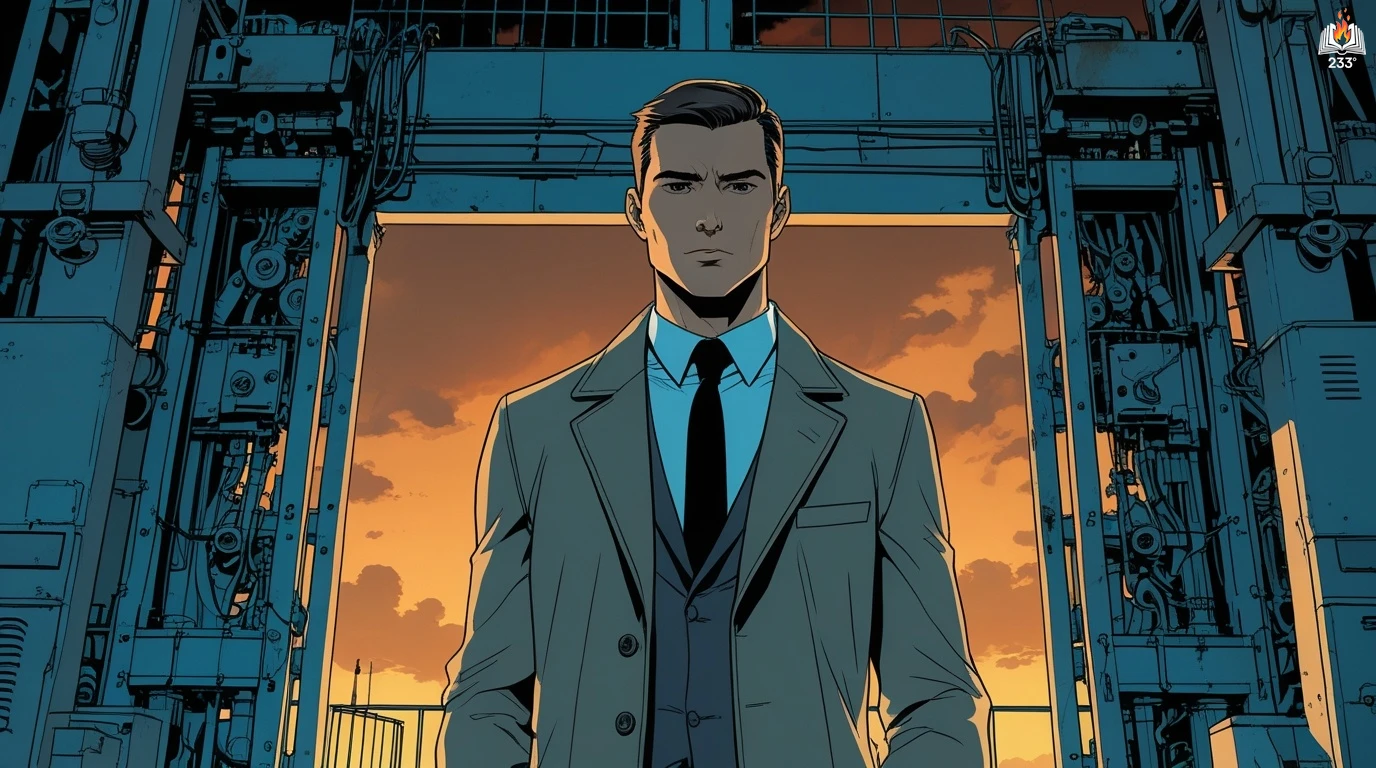Dune Messiah by Frank Herbert, published in 1969, is the second novel in the legendary Dune Chronicles series. As a direct sequel to Dune, it serves as a dark bridge between the triumphant rise of Paul Atreides as Muad’dib and the unraveling of his power. This novel moves beyond the epic heroism of its predecessor, delving into the burdens of prophecy, the corrupting nature of absolute power, and the collapse that follows mythic ascension.
Plot Summary
In the cold marble halls of Arrakeen, where shadows clung to ancient stone and spice perfumed the air, Emperor Paul Muad’dib ruled with the weight of countless worlds pressing upon his shoulders. Twelve years had passed since Paul, once the young Duke Atreides, had claimed the throne of the known universe. His empire was forged in blood and prophecy, bound together by the zealous fervor of a Fremen jihad that swept across the stars. Yet, beneath the grandeur of his court and the power of his vision, Paul walked a path of bitter isolation, a prisoner of his own prescience.
Paul’s nights were haunted by the knowledge of what was to come. His Fremen legions, once proud desert warriors, had become instruments of conquest and terror. Billions had died in his name, and still the chants of Muad’dib echoed across the universe. The man who had risen to godhood now looked upon his creation with despair. The future was a tapestry woven too tightly for him to unravel, a series of moments racing toward inevitable ruin.
Beside Paul stood Chani, his Fremen concubine, the woman who had captured his heart in the unforgiving sands of Arrakis. Chani was both lover and anchor, a fierce presence whose strength held Paul to the realm of men. Yet even their love was not without sorrow. Chani, though devoted, was tormented by her inability to give Paul an heir. Her pain festered in the silent corners of their lives, feeding the schemes of Princess Irulan, Paul’s wife by political arrangement and a Bene Gesserit trained in the art of subtle manipulation. Irulan longed for a child, not from love but from ambition, to secure her place in the empire and in the shadowed plans of the Sisterhood.
While Paul’s inner circle fractured with longing and intrigue, forces beyond Arrakeen stirred in secrecy. A conspiracy, woven by the Bene Gesserit, the Spacing Guild, and the shape-shifting Tleilaxu, took form under the pale light of distant stars. At its heart stood Scytale, a Tleilaxu Face Dancer whose mastery of disguise concealed his lethal intent. With him plotted Gaius Helen Mohiam, the Reverend Mother, and Edric, the grotesque Navigator of the Guild, whose tank of spice gas gave him glimpses into the future but not enough to pierce the shield of Paul’s vision.
Their weapon was Hayt – the ghola, a resurrected Duncan Idaho. Once Paul’s loyal friend and swordmaster, Duncan had died defending Paul and his mother in the bitter days of the Harkonnen war. Now, his body had been reanimated by the Tleilaxu, his memories suppressed, and sent as a gift to the Emperor. Hayt’s presence stirred old grief within Paul, fracturing his resolve and awakening memories better left undisturbed. Yet Paul, with the heavy eyes of a seer, sensed the snare hidden within this familiar face.
Alia, Paul’s sister, watched the unraveling of their world with eyes too old for her young body. Born with ancestral memories awakened before birth, Alia moved through the empire as both priestess and child, feared by many and understood by few. Her sharp mind caught the tremors of betrayal and the whispers of revolt, but even she could not untangle the web tightening around her brother.
Amid the opulence of the imperial court, the conspirators moved. Irulan slipped contraceptives into Chani’s food, desperate to keep her barren and to force Paul into her arms. Edric cloaked their plotting from Paul’s sight with his prescient aura. Scytale prepared his final stroke, confident that the Emperor would fall, not by blade, but by the weight of his own heart.
Yet Chani, wise in the ways of Fremen resilience, turned to ancient herbal remedies to restore her fertility. Against Irulan’s secret sabotage, Chani conceived, her pregnancy a spark of light in Paul’s darkening world. But the price was cruel. Chani’s health withered as the child grew within her, and Paul, for all his power, stood helpless. His love and his empire were set on a collision course, and the echoes of destiny laughed softly in the background.
As Chani’s labor neared, Paul faced the breaking point. Hayt, the ghola, triggered by Scytale’s commands, confronted the Emperor. But the man who had once been Duncan Idaho could not strike the final blow. The memories buried deep within his flesh surged forth, shattering the Tleilaxu programming. In a moment of profound defiance, Hayt became Duncan again, casting off the chains of his creators and standing at Paul’s side.
In the deep chambers of the Keep, Chani gave birth to twins – a son, Leto, and a daughter, Ghanima. The joy of their arrival was shadowed by tragedy. Chani, Paul’s desert flower, slipped away with the final cry of life, leaving Paul to cradle their children in trembling arms. The grief that tore through him was both personal and imperial. The Fremen wept for their Sihaya, the Atreides mourned their jewel, and the empire quaked at the loss of its Queen in all but name.
The conspirators fell in swift succession. Scytale, in a last act of desperation, threatened the lives of Paul’s newborn children, but the Emperor, blind now from the strain of his prophetic burdens, struck with fatal precision, killing the Face Dancer and preserving his fragile legacy. The Bene Gesserit and the Guild retreated into the shadows, their plans unraveled by the resilience of a man they thought broken.
Paul Atreides, once Muad’dib, stood on the edge of a precipice not even he had foreseen. His blindness was not merely of the eyes, but of the soul. He chose to walk into the desert, following the ancient Fremen tradition of the blind who surrender themselves to the sands. Alia was left to rule as regent, the twin heirs cradled in her arms, while Duncan, the man who had crossed the boundary of death, stood watchful in the hollow halls of the Keep.
The desert swallowed Paul as it had swallowed countless others before him. Yet the sands carried more than death – they carried memory, myth, and transformation. And so, the god-emperor disappeared beyond the dunes, leaving behind an empire trembling on the cusp of change, a family forged in love and loss, and a universe forever marked by the name Muad’dib.
Main Characters
Paul Atreides / Muad’dib: Emperor and reluctant messiah, Paul struggles under the weight of his prescient abilities and the empire built on religious fervor. Once a heroic figure, Paul now grapples with deep disillusionment, questioning his humanity and the price of his reign.
Chani: Paul’s beloved Fremen concubine, fiercely loyal and bound to him by love and shared struggle. Chani is a grounding force in Paul’s life, though her inability to bear him an heir becomes a central tension, fueling political maneuvering and personal sorrow.
Princess Irulan: Paul’s official wife and a political pawn from the Bene Gesserit order, Irulan longs for legitimacy and a child of her own. Her marriage to Paul is cold and strategic, highlighting themes of duty, jealousy, and political impotence.
Alia Atreides: Paul’s sister, born with full consciousness and ancestral memories, Alia is both powerful and tragic. Her dual role as regent and oracle places her at the heart of the empire’s intrigue, struggling with her own identity and the dangers of precocity.
Duncan Idaho / Hayt: Resurrected as a ghola (clone) by the Bene Tleilaxu, Duncan returns as Hayt, a conflicted figure wrestling with fragmented memories of loyalty, love, and betrayal. His presence forces Paul to confront past grief and the limits of human engineering.
Scytale: A Tleilaxu Face Dancer and master of deception, Scytale leads the conspiracy against Paul. Coldly pragmatic and cunning, Scytale’s manipulations reflect the larger threats facing the Atreides empire.
Gaius Helen Mohiam: The Bene Gesserit Reverend Mother who conspires against Paul. She embodies the shadowy, manipulative force of the Sisterhood, using genetic and political gamesmanship to try to bend history.
Theme
The Burden of Prophecy: Paul’s prescient vision, once a gift, becomes a curse, trapping him in a web of predetermined outcomes. Herbert explores the cost of knowing the future and the crushing responsibility it imposes.
Power and Corruption: The novel scrutinizes the corrupting nature of absolute power, as Paul’s empire, founded on religious fanaticism, becomes a dystopian regime. Herbert dissects how even well-meaning leaders can become tyrants.
Identity and Humanity: Characters like Paul, Alia, and Duncan/Hayt wrestle with what it means to be human when memory, destiny, and conditioning threaten to erase their autonomy. Identity fractures under political and genetic manipulation.
Religious Fanaticism and Myth: The cult of Muad’dib spirals into a destructive force, illustrating the dangers of deifying human leaders. Herbert warns against blind faith and examines how myths distort the truth of those they glorify.
Love and Sacrifice: Beneath the political and philosophical layers lies a deeply personal story about love, loss, and sacrifice. Paul and Chani’s love faces relentless political pressure, while Duncan’s loyalty spans life and death.
Writing Style and Tone
Frank Herbert’s writing in Dune Messiah is dense, layered, and contemplative, combining intricate political dialogue with philosophical introspection. He uses a mixture of historical analysis, internal monologue, and poetic epigraphs to build a textured world that feels both mythic and deeply personal. His prose often shifts between the grand scale of galactic politics and the intimate turmoil of his characters, creating a tension that sustains the novel’s dark atmosphere.
The tone of the novel is somber, reflective, and at times claustrophobic. Unlike the triumphant tone of Dune, this sequel is saturated with a sense of decline, disillusionment, and fatalism. Herbert deliberately undercuts heroic expectations, showing the painful erosion of idealism under the weight of governance and religious expectation. There’s a constant sense of impending doom, as characters grapple with forces far larger than themselves, both external and internal.
We hope this summary has sparked your interest and would appreciate you following Celsius 233 on social media:
There’s a treasure trove of other fascinating book summaries waiting for you. Check out our collection of stories that inspire, thrill, and provoke thought, just like this one by checking out the Book Shelf or the Library
Remember, while our summaries capture the essence, they can never replace the full experience of reading the book. If this summary intrigued you, consider diving into the complete story – buy the book and immerse yourself in the author’s original work.
If you want to request a book summary, click here.
When Saurabh is not working/watching football/reading books/traveling, you can reach him via Twitter/X, LinkedIn, or Threads
Restart reading!








